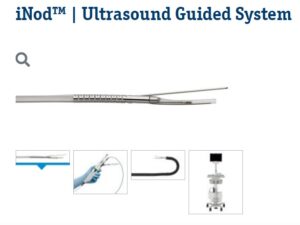
Wissam Abouzgheib, MD
(CAMDEN, NJ) – Pulmonary experts at Cooper University Health Care were the first in the world to use Boston Scientific’s iNodTM Ultrasound Guided Biopsy Needle in conjunction with robotic bronchoscopy, a new tool used to investigate suspicious peripheral pulmonary lesions in the lung, potentially leading to earlier diagnosis and treatment of lung cancer.
Peripheral pulmonary lesions are small suspicious growths located in distant outlying regions of the lung that are often hard to reach and biopsy due to their size and location. The iNod system allows physicians to accurately maneuver through the lung tissue to reach these small lesions under real-time ultrasound guidance and remove a sample to test for malignancy.

“Because of the difficulty of reaching small peripheral pulmonary lesions, physicians frequently took a conservative approach by closely observing growth or changes to the lesion over time or using more complicated methods to reach the suspected tumor. With this new system, we can reach these small growths and biopsy them sooner, potentially diagnosing lung cancer and beginning treatment much sooner,” said Wissam Abouzgheib, MD, division head of Pulmonary Medicine and section head of interventional Pulmonology at Cooper.
Pulmonary and Interventional Pulmonary Medicine
Pulmonary medicine specialists at Cooper treat disorders of the lung, including chronic diseases such as emphysema and asthma, and acute pulmonary problems such as pneumonia. Interventional pulmonology is a specialized area of pulmonary medicine in which pulmonologists use advanced tools and techniques to diagnosis and treat diseases of the lungs and chest. Cooper interventional pulmonologists are an essential component of the MD Anderson Cancer Center at Cooper Lung Cancer Center team.
Lung cancer is the leading cause of cancer deaths in both men and women in the U.S. According to the American Cancer Society, about 238,340 new cases of lung cancer will be diagnosed in the U.S. in 2023, with about 127,070 deaths.
“Examining and testing the smallest lesions in the lung even sooner can have big implications in treatment options and outcomes,” Dr. Abouzgheib said. “At Cooper, we are committed to continually investigating and adopting the latest and most advanced technology and procedures for the benefit of our patients.”
About Cooper University Health Care
Cooper University Health Care, with its MD Anderson Cancer Center at Cooper and affiliation with Cooper Medical School of Rowan University, is a leading academic health system. Cooper has more than 9,600 team members including 1,600 nurses, and more than 900 employed physicians and 450 advanced practice providers. Cooper University Hospital has been recognized as a top-performing regional hospital by U.S. News & World Report’s 2022-2023 Best Hospitals annual survey and has an “A” Hospital Safety Grade from The Leapfrog Group, a national nonprofit upholding the standard of patient safety in hospitals and ambulatory surgery centers.
Cooper has revenues of more than $2 billion and has an “A-” rating from S&P Global Ratings and “A3” rating from Moody’s Investors Service. Cooper University Hospital is the only Level 1 Trauma Center in South Jersey and the busiest in the region. Nearly two million patients are served annually at Cooper’s 663-bed flagship hospital, outpatient surgery center, three urgent care centers, and more than 100 ambulatory offices throughout the community. Cooper has been named as one of America’s Best Employers by Forbes for two consecutive years.
The Cooper Health Sciences campus in Camden, New Jersey, is home to Cooper University Hospital, MD Anderson Cancer Center at Cooper, Children’s Regional Hospital at Cooper, and Cooper Medical School of Rowan University. Visit CooperHealth.org to learn more.
